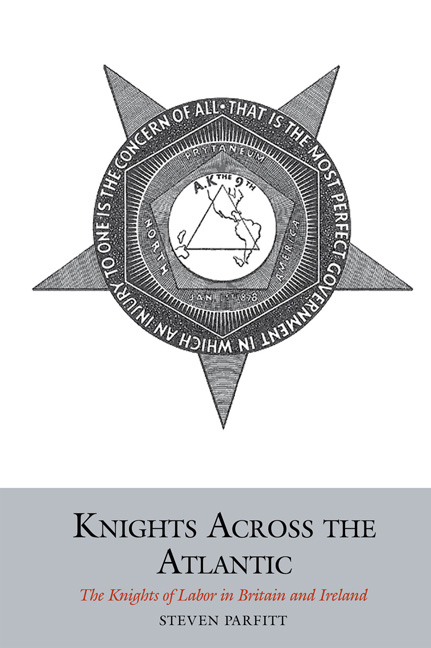Book contents
- Frontmatter
- Contents
- Acknowledgements
- Introduction: The World of the Knights of Labor
- 1 Origins
- 2 The Rise of a Transnational Movement
- 3 Organisation, Culture and Gender
- 4 The Knights in Industry
- 5 The Knights and Politics
- 6 The Knights and the Unions
- 7 The Fall of a Transnational Movement
- Conclusion: The Knights of Labor in Britain and Ireland
- Appendix: List of Known Assemblies of the Knights of Labor in England, Scotland, Wales and Ireland
- Bibliography
- Index
Conclusion: The Knights of Labor in Britain and Ireland
- Frontmatter
- Contents
- Acknowledgements
- Introduction: The World of the Knights of Labor
- 1 Origins
- 2 The Rise of a Transnational Movement
- 3 Organisation, Culture and Gender
- 4 The Knights in Industry
- 5 The Knights and Politics
- 6 The Knights and the Unions
- 7 The Fall of a Transnational Movement
- Conclusion: The Knights of Labor in Britain and Ireland
- Appendix: List of Known Assemblies of the Knights of Labor in England, Scotland, Wales and Ireland
- Bibliography
- Index
Summary
In 1896, M.J. Bishop, the General Worthy Foreman of the Knights of Labor, drew the attention of the General Assembly to ‘the attempt to form an international organisation of longshoremen, dockworkers and men employed generally on the waterfront, with the avowed intention of forcing their interests to the fore regardless of all others.’ Bishop attacked ‘the folly of the whole proceeding’ in withering terms. ‘We are entering upon an era of competition in the labor market which has never had a duplicate on the earth,’ he told the assembled delegates, ‘in very skilled occupation inventive genius is putting the craftsman upon a level with the common labourer.’ Under these circumstances, he claimed, ‘any combination, based upon the lines of trade, craft or occupation, which has for its main purpose an intention to force its views upon employers through a strike, must meet with sudden and disastrous failure.’ Bishop concluded that ‘the trade union methods which the Knights of Labor were originally formed to obviate and supersede, will no longer serve to protect the toiler from the greed and oppression of unscrupulous employers.’
In the same year the General Worthy Foreman also became a participant in a transatlantic slanging match with James Mawdsley, a veteran of the Parliamentary Committee of the TUC and the general secretary of the Amalgamated Association of Operative Cotton Spinners. Mawdsley was not a typical TUC leader – he resigned from the Parliamentary Committee in 1890 in protest at the rising socialist influence within the Congress and later stood alongside Winston Churchill as a Conservative parliamentary candidate for a two-member constituency – but his words still carried some weight. Mawdsley visited the United States in 1895 and relayed his impressions to Reynolds's Newspaper. One report in particular raised the ire of Bishop and other leading Knights, when Mawdsley wrote that ‘the “Knights” have, during the past five years, been going down as all systems built on folly must do in the long run.’ The Journal of the Knights of Labor attacked his ‘concentrated pig-headed presumption and asinine assumption of “know-it-all-iveness.”’ Bishop responded in the pages of Reynolds's by referring to the ‘large following’ that the Order supposedly still had in Britain and Ireland. ‘Were it not for such methods’ as Mawdsley's, he argued, ‘we would now have a much larger one everywhere.’ The British trade unionist, however, had the final and decisive word.
- Type
- Chapter
- Information
- Knights Across the AtlanticThe Knights of Labor in Britain and Ireland, pp. 223 - 232Publisher: Liverpool University PressPrint publication year: 2016



